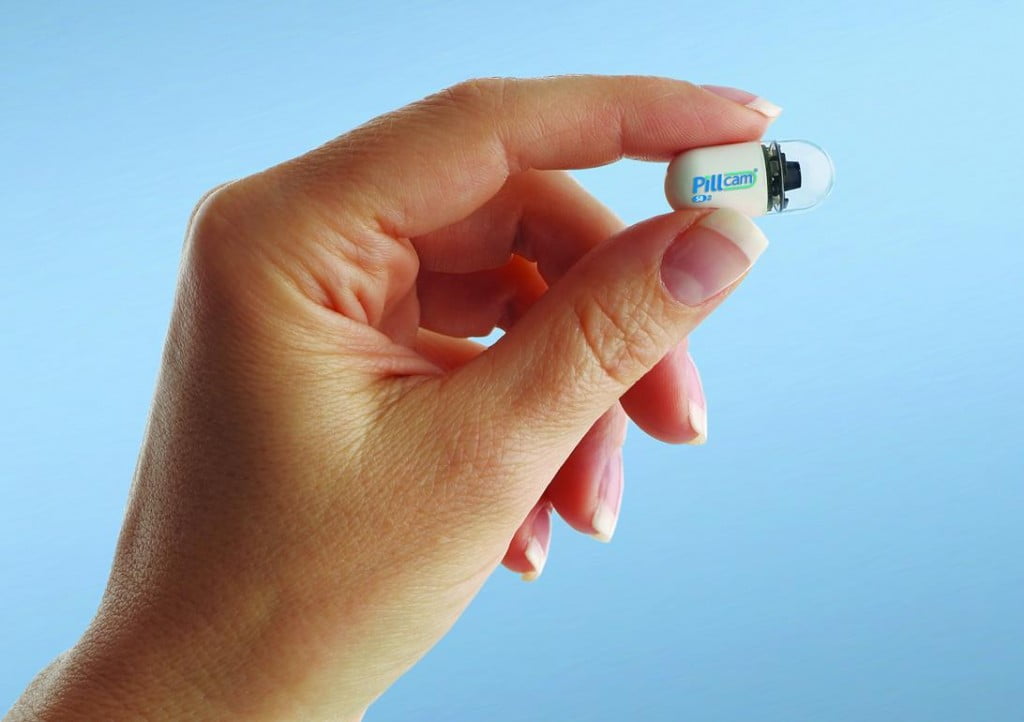To screen for colorectal cancer, both men and women over 50 are advised to undergo a colonoscopy every 10 years. Unfortunately, because of the sometimes uncomfortable nature of the procedure, many people choose not to undergo it.
Given Imaging, an Israeli medical technology company, pioneered a non-invasive method of detecting disorders in the gastrointestinal (GI) tract. PillCam, the aptly named product, is a pill-sized camera ingested by patients, which allows physicians to visualize the esophagus, colon, and areas of the small intestine.
Related articles
- Israeli Students Develop Device That Could Revolutionize Intubation
- Israeli Company Develops The Hospital Bed Of Tomorrow
The birth of PillCam
Given Imaging was founded in 1998 by Dr. Gabi Iddan and Dr. Gavriel Meron. Iddan first conceived of PillCam while working in the missile division of Raphael (Raphael Advanced Defense Systems). Iddan envisaged the possibility of using missile technology in a miniaturized form in order to create a medical product. The PillCam capsule is 11mm x 26mm and contains a mini video camera that is equipped with a light source, batteries, radio and antenna.
In August of this year, Given Imaging’s PillCam SB3 received FDA approval.
How does it work?
After fasting for 10 hours, patients swallow the PillCam and allow it to pass naturally through the digestive system. In the subsequent eight-hour period, PillCam transmits approximately 50,000 images via a sensor belt worn around the patient’s waist to the PillCam recorder. These images can then be downloaded and reviewed by the physician. PillCam’s technology allows physicians to visualize the small bowel, esophagus and colon, which is vital for detecting various abnormalities and diseases, such as obscure gastrointestinal bleeding (OGIB), iron deficiency anemia (IDA), Chron’s disease, esophageal varices, Barret’s esophagus and esophageal cancers.
[youtuber youtube=’http://www.youtube.com/watch?v=Og_y3XOMWRI’]
Sign up for our free weekly newsletter
SubscribeCapsule endoscopy vs traditional endoscopy
Unlike traditional endoscopic procedures, capsule endoscopy does not require any sedation. It is a simple process and allows patients to continue with their daily activities while the capsule passes through their digestive system. Capsule endoscopy is also the only technology that allows the visualization of the entire small bowel, an area that cannot be reached with traditional endoscopic methods.
PillCam is also vital to patients who are not able to undergo traditional endoscopy, like when the colon is partially obscured (occurs in five percent of procedures) or for patients for whom sedation is a risk.
According to some studies, 50 percent of Americans aged 50 and above choose to forgo colonoscopies, despite the fact that 60 percent of colon cancers are diagnosed at later stages of the disease, and only five percent of people diagnosed at the late stage of the disease survive more than five years.
Taking to the market
Since commercializing capsule endoscopy in 2001, approximately 1.7 million patients worldwide have been exposed to PillCam. Given Imaging manufactures a variety of diagnostic products for the gastrointestinal tract. PillCam SB received FDA approval in 2001, while PillCam ESO was cleared in 2004.
PillCam is cheaper than traditional colonoscopy, costing around $500, while colonoscopies can cost $800-$1200. There are some minor risks however, as capsule retention has been reported in less than two percent of capsule endoscopy procedures. Capsule retention is defined as having a capsule that remains in the digestive tract for more than two weeks.
Photos: Given Imaging
Related posts

Israeli Medical Technologies That Could Change The World

Harnessing Our Own Bodies For Side Effect-Free Weight Loss

Missing Protein Could Unlock Treatment For Aggressive Lung Cancer




Facebook comments